You are here:
Home > Education > Professional Development
Have a Question or Comment? Let us know!
Professional Development
Hands-on interdisciplinary workshops, seminars, conference sessions, and presentations are available for teachers, youth leaders and non formal educators. Most workshops are held at no cost to the participant. Open workshops are available, but most workshops are associated with partner organizations and agencies. Sessions being held with partner organizations will be listed in "upcoming workshops and presentations" below.
The District can facilitate workshops and training sessions for your school or school district as an in-service day or early release training. Workshops can be tailored to interests of school based on available time. There is no expense for workshop materials, trainer's time and some of the workshop guidebooks. Inservices can be workshop offerings below or focused on a topic area such as household hazardous waste, recycling, natural resources, sustainability, etc...
- CSI: Compost Science Investigation, Grades K-3
- Environmental Experiences for Early Childhood, Grade PreK-3
- Food, Land and People, Grades PreK-12
- Growing Up WILD, Grades PreK-3
- Leopold Education Project, Grades 6-12
- Make the Connection to Climate Change, Grades 6-8
- Population Connection, Grades K-12
- Project WET (Water Education for Teachers), Grades K-12
- Project WILD, Grades K-12
- Talkin’ Trash with Aluminum Beverage Cans, Grades 6-9
- Windows On Waste (WOW), Grades 3-6
- Workshop on Wheels, Grades K-12
Upcoming Workshops & Presentations
To bring Kathleen into your school for an inservice, please call 216-443-3731.
CSI: Compost Science Investigation
Grades K-3 Minimum hours: 1.5 hours
The Compost Science Investigation is a series of activities where student’s observe and experiment to learn about the process of composting. The five lessons can be used together or separately to compliment current classroom activities. The lessons meet science and social science indicators. The workshop can be done for a half or whole day depending if a tour is involved.
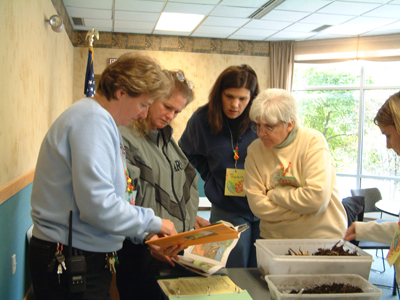
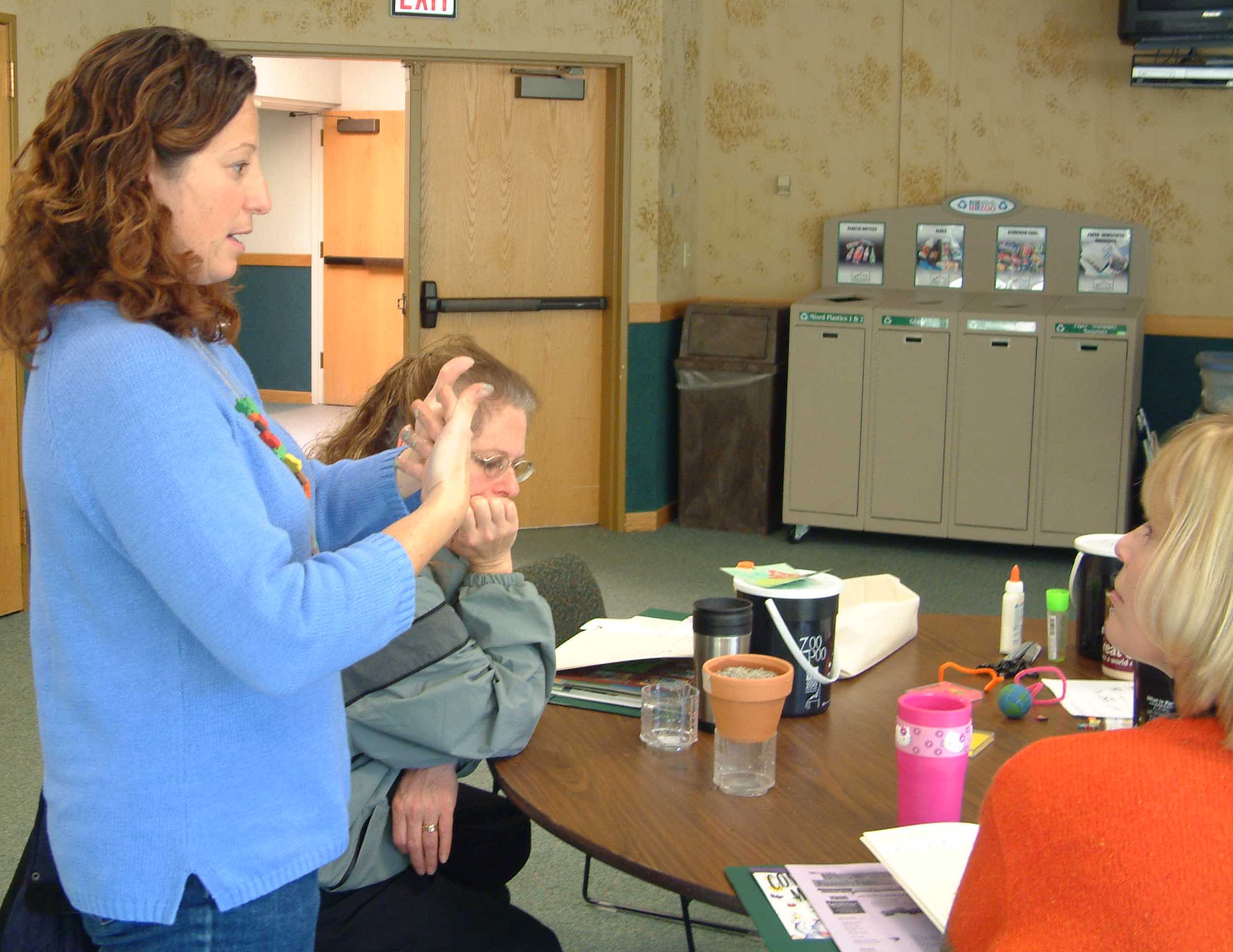
Environmental Experiences for Early Childhood
Grade PreK-3 Minimum hours: 3.0
This is Project Learning Tree's early education activity book for educators who work with children ages 3 to 6. It offers over 130 experiences that engage children in outdoor play and exploration. Topics include exploring nature with five senses, meeting neighborhood trees, and experiencing trees through the seasons. An accompanying CD features music from children's musician Billy B. Brennan that encourages children to sing, dance, and move.
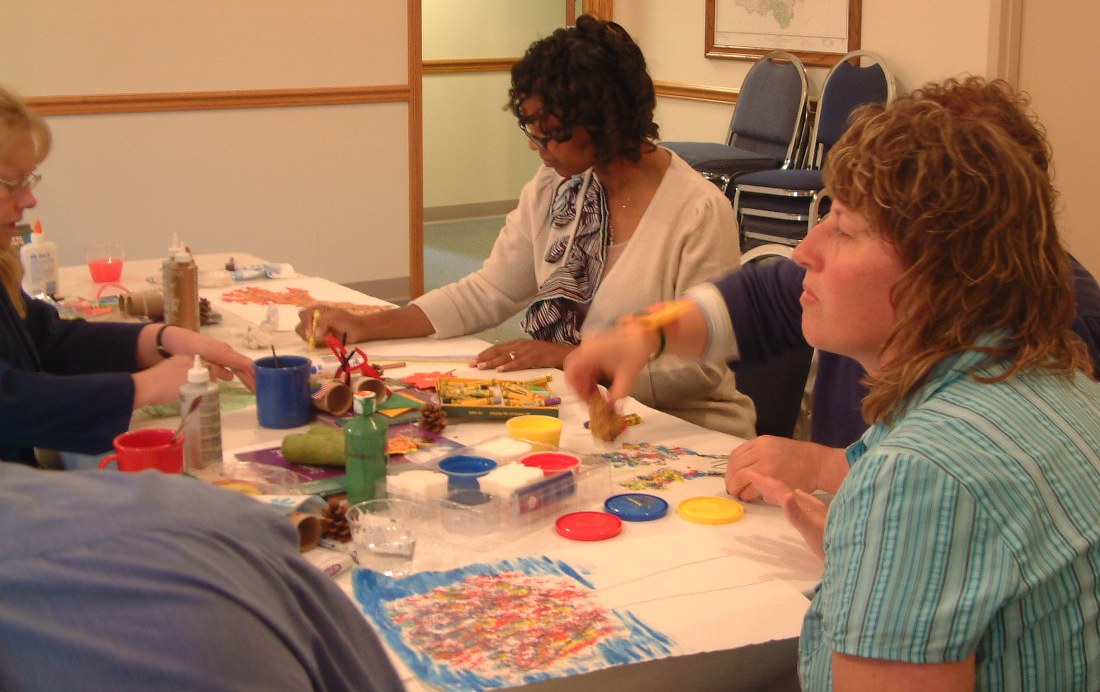
Food, Land & People
Grades PreK-12 Minimum hours: 6 hours
FLP is an interdisciplinary, supplementary education program with 55 lessons for educators and students to better understand the interrelationships among agriculture, the environmental and the people of the world. The lessons contain enough background information, teaching aids and methodology to be taught without the need for additional support. Teachers are trying out the two different activities in the guidebook.
FLP is an interdisciplinary, supplementary education program with 55 lessons for educators and students to better understand the interrelationships among agriculture, the environmental and the people of the world. The lessons contain enough background information, teaching aids and methodology to be taught without the need for additional support. Teachers are trying out the two different activities in the guidebook.
Growing Up WILD
Grades PreK-3 Minimum hours: 3 hours
This is the Project WILD's early childhood education activity guide. It builds on the learning styles and interests of young children to foster an interest and appreciation of wildlife and the natural world around them. A variety of activities build positive impressions of nature while aiding children's cognitive growth and development. It is correlated to the National Association for the Education of Young Children (NAEYC) Standards and the Head Start Domains. $12 for the book with no additional fees for supplies and support materials.
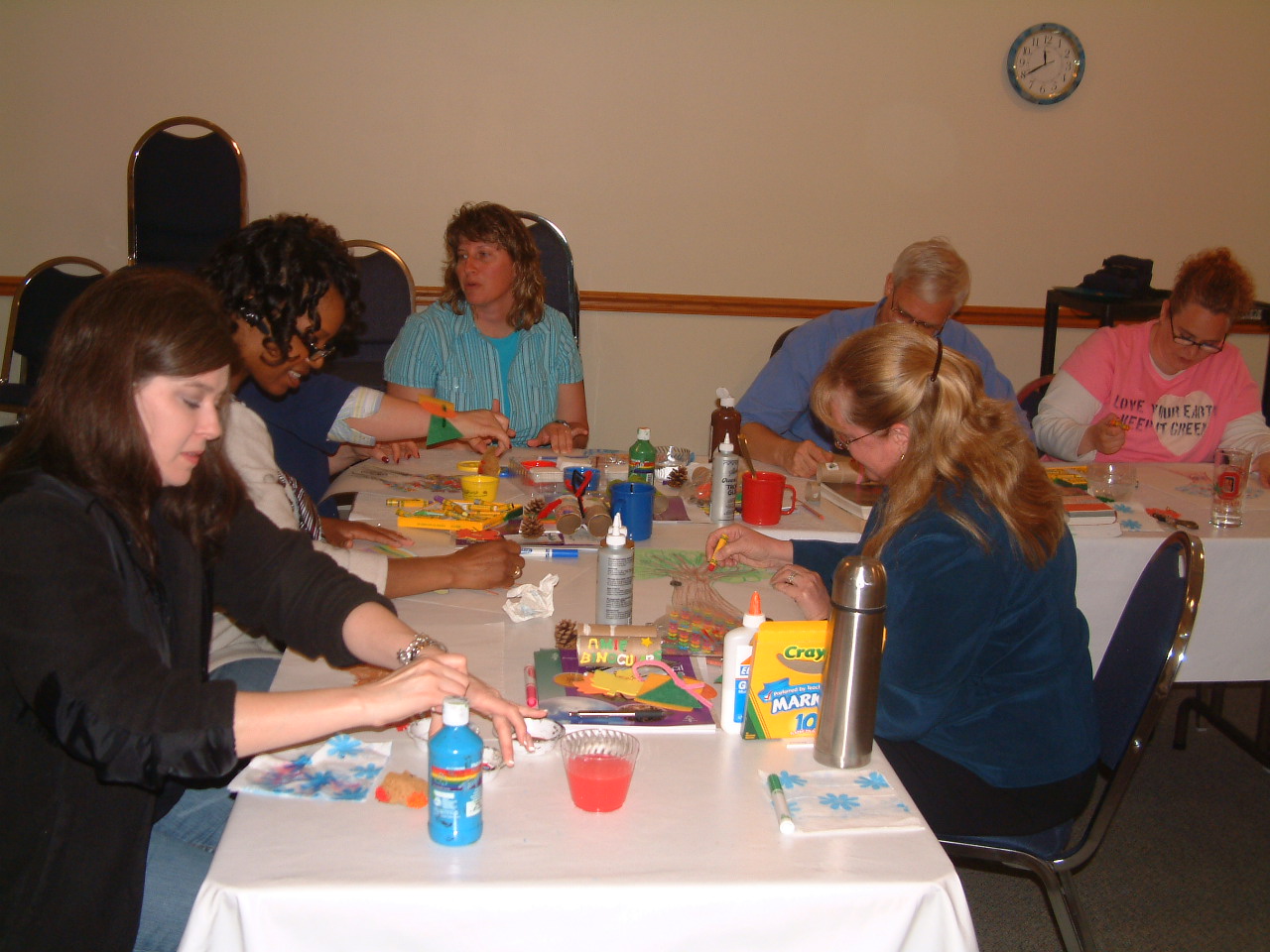
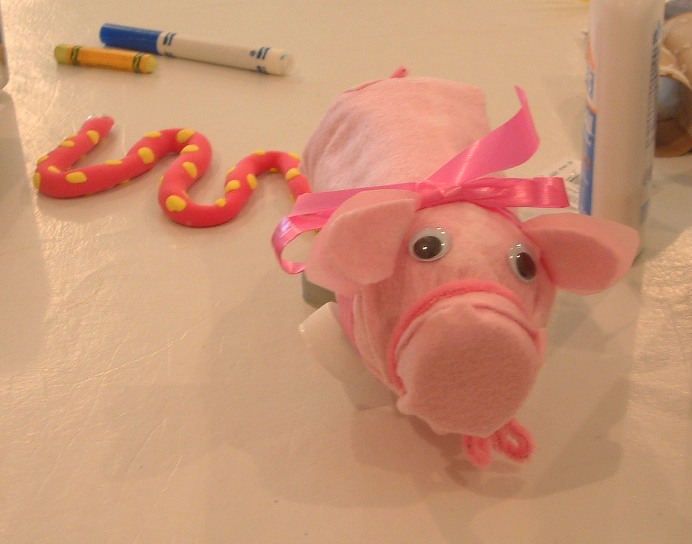
Leopold Education Project
Grades 5-12 Minimum hours: 4
The Leopold Education Project (LEP) is an interdisciplinary, critical thinking, conservation and environmental education guidebook. LEP is designed to compliment the Sand County Almanac Essays, a famous literary work by Aldo Leopold. It contains 22 activities based on essays from Part I, the "Almanac." The activities connect students to the environment and develop responsible environmental values; thus, improving their decisions that impact the earth.
Make the Connection to Climate Change
Grades 6-8
Expand your teaching to take care of our earth. Educators will gain knowledge and learn activities that will provide insight to climate change and lead students to live more sustainable lifestyles. Activities deal with energy, carbon cycle, carbon footprint, solutions, etc... We will be using Facing the Future's Climate Change: Connections and Solutions, which provides a two-week interdisciplinary unit for middle school. This session offers information, resources and hands-on activities.
Population Connection
Grades K-12
Learn more about www.populationeducation.org and contact 1-800-POP-1956 to set up a workshop.
Expand your teaching to take care of our earth. Educators will gain knowledge and learn activities that will provide insight to climate change and lead students to live more sustainable lifestyles. Activities deal with energy, carbon cycle, carbon footprint, solutions, etc... We will be using Facing the Future's Climate Change: Connections and Solutions, which provides a two-week interdisciplinary unit for middle school. This session offers information, resources and hands-on activities. Learn more about and contact 1-800-POP-1956 to set up a workshop.
Project WET (Water Education for Teachers)
Grades K-12 Minimum hours: 6
Project WET is an international, interdisciplinary, water education program with over 90 indoor and outdoor activities covering the broad range of water issues. All Project WET and WILD lessons correlate to Ohio Education indicators. Teachers learn about watersheds inside and outside of the classroom.
Project WILD
Talkin’ Trash With ABCs
Grades 6-9 No minimum hours
Talkin' Trash With Aluminum Beverage Cans is a middle school environmental activity guidebook from the Can Manufacturing Institute. It contains ten hands-on activities that help present and future generations approach environmental and scientific dilemmas and social concerns creatively and proactively. Activities will develop critical-thinking skills while addressing science, social studies, math and language arts indicators. Students demonstrate the can swat game.
Talkin' Trash With Aluminum Beverage Cans is a middle school environmental activity guidebook from the Can Manufacturing Institute. It contains ten hands-on activities that help present and future generations approach environmental and scientific dilemmas and social concerns creatively and proactively. Activities will develop critical-thinking skills while addressing science, social studies, math and language arts indicators. Students demonstrate the can swat game.
Windows On Waste (WOW)
Grades 3-6 Minimum hours: 2
The Ohio Department of Natural Resources (ODNR) guidebook provides 36 activities organized in fourteen units on solid waste and environmental issues. Activities pertain to real world environmental issues that the student can participate in solving. Each activity includes background information, objectives, learner centered inquiry approaches, procedures, assessments, extensions and student worksheets. The activities meet indicators for science, math, social studies and language arts. Free guidebook. As an icebreaker, teachers are guessing which compost critter they have on their back. The facilitator is explaining that trash causes problems for the environment during a WOW workshop. A landfill can be good to eat if its out of food. Here a teacher adds the methane pipe to her almost complete landfill. Teachers are finding green recipes instead of using chemicals to clean the house.

.
Workshop on Wheels
Grades K-12 Hours vary based on field trips
This is a workshop on the move, so teachers watch a landfill, material recovery facility, compost facility or paper factory in operation. Teachers will learn where garbage and recyclables go. A chartered bus will take teachers to field trip sites. Activities and videos are incorporated during travel to be used in classroom. Tours can include a variety of recycling businesses and green buildings. This recycling road trip traveled to a recycle center and compost site to see recycling in action.
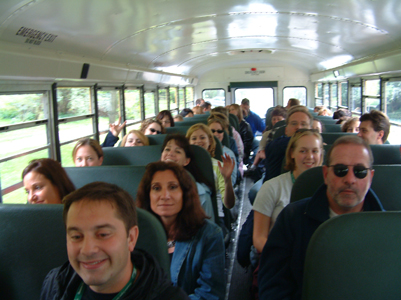
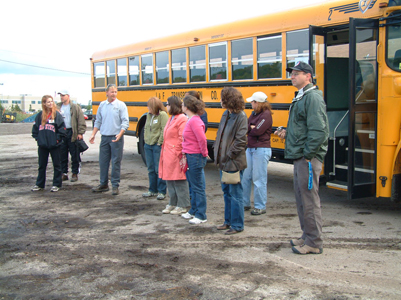
Instructor Biography
Kathleen M. Rocco has been know as an environmental educator and mentor to children and adults for over twenty years. Indirect titles given in the above jobs include fire starter, storyteller, toilet cleaner, dish washer, table mover, lost items finder, flagger, greeter, cook, peace maker, salary calculator, nurse, tree hugger and motivator. For five summer seasons and four years, Kathleen worked for YMCAs in Ohio, Michigan, New York and Delaware building children's self esteem and their knowledge about the outdoors and the environment.
Since October of 2000, Kathleen has been the Education Specialist for the Cuyahoga County Solid Waste District, where she teaches about reduce, reuse and recycle. She has visited hundreds of classrooms and youth groups sharing an environmental message with over six thousand students annually. Through outreach efforts to civic groups, institutions and seminars for the general public, Kathleen teaches about composting, recycling, and greening your house to achieve a healthier and more sustainable lifestyle. Kathleen practices what she preaches through composting, recycling, collecting rainwater, reusing materials in home improvement projects and raising red wiggler worms that eat fruit and vegetable scraps.
Over the years, Kathleen has contributed her time and expertise on projects with education or environmental organizations. Currently, she assists the Ohio Association of Litter Prevention and Recycling as Vice President, and Green Schools Committee of Northeast Ohio United States Green Building Council as Chair.
Kathleen has completed a Masters of Environmental Studies through The Institute of Environmental Sciences from Miami University and a Bachelor of Science in Biology from the University of Dayton. Her favorite courses during college and graduate school were hands-on learning experiences studying ecology in the Florida Keys, Sapelo Island Georgia, Lake Erie, Smokey Mountains and Costa Rica, and a yearlong public service project on preserving green space along the Four Mile Creek Corridor. As a teaching intern for Sterling College's Southwest Field Program, Kathleen learned firsthand about how experiential education deepens learning for adults through taste, touch, smell, sight, hearing and sweat.
Other Environmental Educator Workshop Offerings